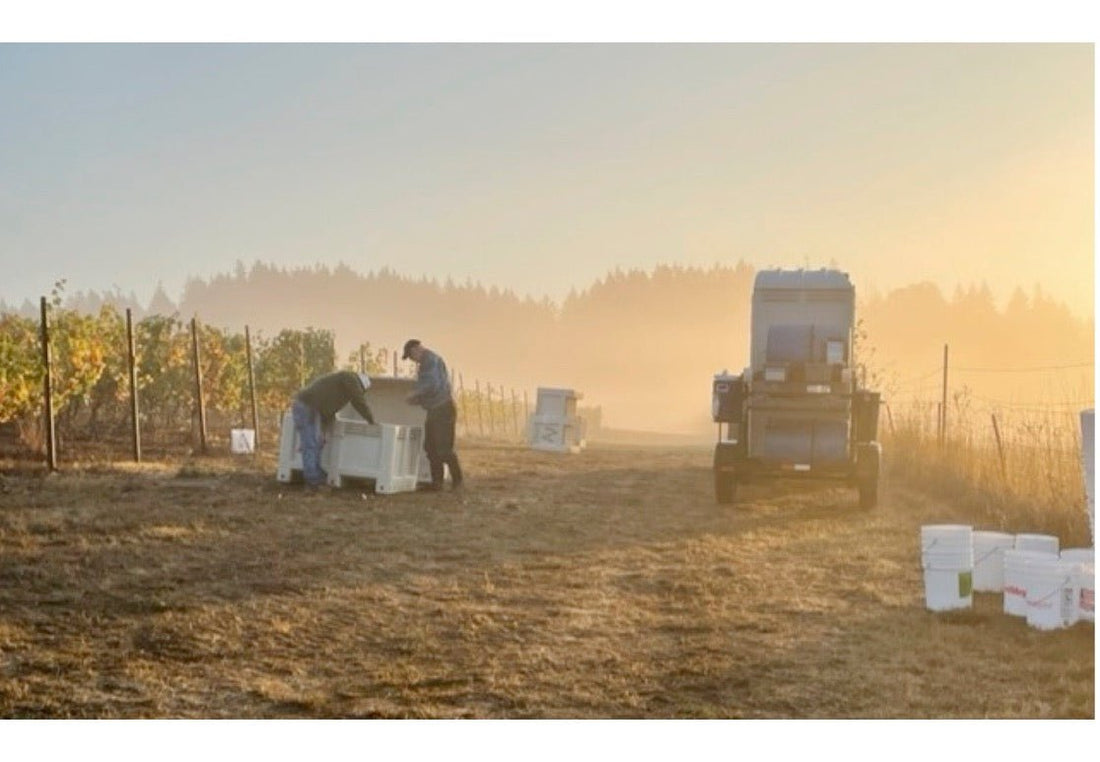Ron Sanchez of Domaine Verdant
Mike MortensenShare
Domaine Verdant - Oregon
Ron Sanchez makes some of the best wine in the world if you ask us. Ron belongs to the group that tastes his wine and only sends it out when he thinks it is perfect. It results in totally well-balanced wine, which has the completely complex and controlled finish. Roughly speaking, nothing comes out of his cellar that hasn't been tested for release several times - whether it takes 3 or 7 years, that's not what should matter.
You can taste the passion
Can you taste "passion"? Yes, you can! Here at us, we are convinced that passion can be tasted, and we get that feeling considerably when we taste Ron's wine. Work has been put into growing the grapes, which are hand-harvested and then vinified to Ron's taste.
Domaine Verdant's vineyards are located in the heart of the Yamhill-Carlton AVA, one of the premier Oregon pinot noir AVAs defined within the much larger Willamette Valley AVA. Located approximately one hour southwest of Portland, Oregon, the Yamhill-Carlton AVA is home to some of Oregon's oldest and best-known pinot noir vineyards and wineries.
Microclimate
Domaine Verdant's moderately sloping, south-facing vineyards lie at an altitude of 80 to 100 meters above sea level. The vineyard's moderate elevation and location help provide a cycle of day and night temperatures ideal for flavor, aroma and color development in their pinot noirs and chardonnays. During the growing season, daytime temperatures typically range from mid-23 to 29 degrees, while nighttime temperatures range from 12 to 18 degrees. The moderate daytime temperatures are typical of summers in the Willamette Valley. A breeze coming from the Pacific Ocean that regularly moves through a gap in the coastal range of mountains known as the Van Duzer Corridor brings cool sea breezes across its vineyards and prevents accumulations of afternoon heat that can impair the delicate processes of flavor and color development in pinot and chardonnay grapes. The fortuitous combination of moderate daytime heat and cool afternoons and evenings in the vineyards brings a depth and delicacy of Pinot and Chardonnay flavors that make the wines sought after by oenophiles worldwide.
Terroir
Domaine Verdant's moderately sloping, south-facing vineyards lie at an altitude of 80 to 100 meters above sea level – an altitude with particular geological consequences for our wines. The soil through the central Willamette Valley of Oregon is generally sedimentary soil from ancient seabeds uplifted with the tectonic plate movements that created the coastal mountains and hills of the Pacific Northwest United States. After the last ice age, about 12,000 years ago, a catastrophic event called the Missoula River, however, a glacial lake the size of one of today's Great Lakes burst its dam of glacial water and sent a wall of melted glacial water in a width and height of several hundred meters. This is what is today the Columbia River lake. The massive flood brought soil and granite from the mountains of Montana and Idaho, along with pulverized wood from flooded forests along the way, into the natural lake now occupied by Portland, Oregon, and the foothills south of Portland. The Missoula River reached what is now the Yamhill-Carlton AVA and peaked at an elevation of about 97 meters at the site of their vineyards. The headwaters of the Missoula River at what would become the winery's location 12,000 years later brought a unique blend of highly mineral soil and glacial gravel that deeply enriches the underlying sedimentary soil of their vineyards. The resulting mix of alluvial and sedimentary soils allows Domaine Verdant to make pinot and chardonnay wines with a very distinctive mineral structure and finish, which is the perfect complement to the intense fruit flavors, such as the Dijon clones of pinot noir, pinot blanc , pinot gris and chardonnay give.
Ron Sanchez
Our Vineyards and Our Vines
Originally planted in 1998-1999, our 10 acres of vineyards are amongst the oldest plantings in the Yamhill-Carlton AVA and include only classic Dijon clones of pinot noir and chardonnay, as well as selected European clones for pinot blanc and pinot gris.
Pinot Noir
Our seven and a half acres of pinot noir vines are divided roughly equally among Dijon clones 113, 114,115, 777, and Pommard. This palette of classic Bourgogne pinot types enables us to make exceptional single-varietal wines that beautifully express the distinctive character of each clone as it develops each season in our vineyards, as well as carefully selected blends of clones that express the unique microclimate and terroir of our Yamhill vineyards each season.
Pinot Blanc and Pinot Gris
Our small plantings of pinot blanc (Weissburgunder clone) and pinot gris (Colmar clone) — approximately 1⁄4 acre each – are dedicated to limited-quantity production of barrel-aged, single-varietal white pinot wines that artfully elicit the delicate fruit and floral characters that only attentive cultivation and winemaking can achieve with these classic European varietals.
Chardonnay
Our two acres of chardonnay include Dijon clones 76, 96, and 548, a portion of which were also planted in 1998-1999. The pairing of Dijon clones 76 and 96 from our vineyards yields chardonnay wines with stunning depth of stone fruit and tropical fruit flavors, complemented by a cleansing minerality on the finish conferred by our sedimentary and alluvial soils. Our Dijon clone 548 vines, planted in 2015, are slated for single-varietal chardonnay wines beginning in 2019.
Our Viticulture
Our viticultural practices are founded on our deep commitments to the quality of our wines and to the preservation and enhancement of Oregon's beautiful natural environment.
Quality as the Only Priority
As our friends and fellow winemakers in Bourgogne have long said, we believe that great wines are made in the vineyard. In our Domaine Verdant vineyards, we have only one priority: the growing of grapes that will produce wines that are consistently recognized as among the very best in the world. To that end, we have created a "culture of viticulture" in which everyone who works in our vineyards understands and lives out our commitment to growing the highest-quality grapes for our wines. What that means in practice is that in our vineyards we always choose quality over quantity and quality over economy or expediency. As a result, we spare no expense in our efforts to bring out the very best that each varietal and clone can develop in our vineyards.
Our Commitment to the Environment
Unlike some viticultural areas in the increasingly consolidated and corporatized global wine industry, Oregon wines are still largely made by dedicated small producers who live on their wine estates and who are deeply committed to preserving Oregon's beautiful natural environment. We share that commitment, and we follow through on our commitment by being LIVE-certified sustainable and Salmon-Safe since 2012, viticultural practices that contribute to the sustainability and biodiversity of our natural environment.

